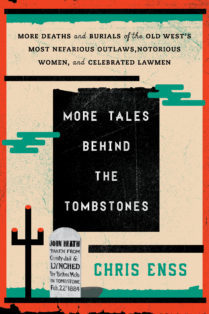Enter to win a copy of More Tales Behind the Tombstones: More Deaths and Burials of the Old West’s Most Nefarious Outlaws, Notorious Women, and Celebrated Lawmen

“[Seth Bullock is a] splendid-looking fellow with his size and subtle strength, his strongly marked, aquiline face with his big mustache, and the broad brim of his soft hat drawn down around his hawk eyes.”
—President Theodore Roosevelt
It wasn’t a bullet from an outlaw’s six-shooter or an enemy soldier in the Spanish-American War that claimed the life of one of the fiercest lawmen in the history of the Dakotas. Seth Bullock died of colon cancer. The accomplished businessman, rancher, politician, and lawman suffered with the disease for years and he died in September 1919 at the age of sixty-two. Born in Amhertberg, Ontario, Canada, in August 1876, six decades later he was remembered for his strength of character as well as the influence he had on the wild frontier.
According to the September 28, 1919, edition of the Kansas City Star, before Seth Bullock made his mark on the Black Hills of Dakota, he was a pioneer in Montana. He was the first sheriff in Helena, Montana, and a member of a famous vigilance committee that rid the region of a desperate band of horse thieves.
Upon hearing that gold had been discovered in the Black Hills, Seth and some of his friends decided to go to that area of the country in the summer of 1876. In March 1877, he became Lawrence County, Dakota’s first sheriff. The gold camp contained some of the most notorious, cutthroat criminals in the country. Many were intimidated by the lawman.
Seth dressed like a minister, had the stare of a mad cobra, and was silent as a confidential clerk working for Rockefeller. In the beginning, his ability to effectively do his job in Lawrence County was challenged by an outlaw who intensely disliked the lawman. He gave orders that Seth should leave the camp and never return. The man threatened to shoot Seth if he didn’t go. After being warned by friends, the sheriff borrowed a squirrel gun from an old hunter and proceeded down the street to the saloon where the desperado was waiting. When the man saw Seth unafraid and coming right for him, he backed down and fled the scene.
As a representative of law and order, the Dakota lawman tracked down a number of stage robbers, gamblers, and murderers, and, according to the October 1, 1919, edition of the Fort Wayne Journal Gazette, killed more than twenty-five lawbreakers who refused arrest.
In addition to his career in law enforcement (Seth also served as a United States marshal in Western Dakota Territory) he co-owned and operated a hardware store and warehouse in Deadwood with his business partner Sol Star. It was one of the most prosperous companies in the Black Hills.
Seth met Theodore Roosevelt in 1884. Roosevelt was a deputy sheriff in Medora, North Dakota, and had tracked a criminal to Seth’s jurisdiction. The two lawmen became fast friends. He became one of Roosevelt’s Rough Riders in the Spanish-American War and was named captain of one of the future president’s troops.
Seth was an elected representative to the Senate and introduced the resolution to set aside Yellowstone as a national park. He was the first forest supervisor of the Black Hills and the cofounder of the mining town Belle Fourche.
Seth was serving his third term as United States marshal for the District of South Dakota when he was diagnosed with cancer. Friends and family noted that in spite of his health he refused to be complacent. He continued on with his work regardless of the debilitating illness.
When President Roosevelt died in January 1919, Seth decided to erect a monument in his friend’s honor. He oversaw the building of a stone tower known as Mount Roosevelt on Sheep Mountain located five miles from Deadwood. The tower was completed in June 1919. Seth died on September 23, 1919, at his home surrounded by his loved ones. He was buried at Mount Moriah Cemetery in Deadwood. His grave faces Mount Roosevelt.


